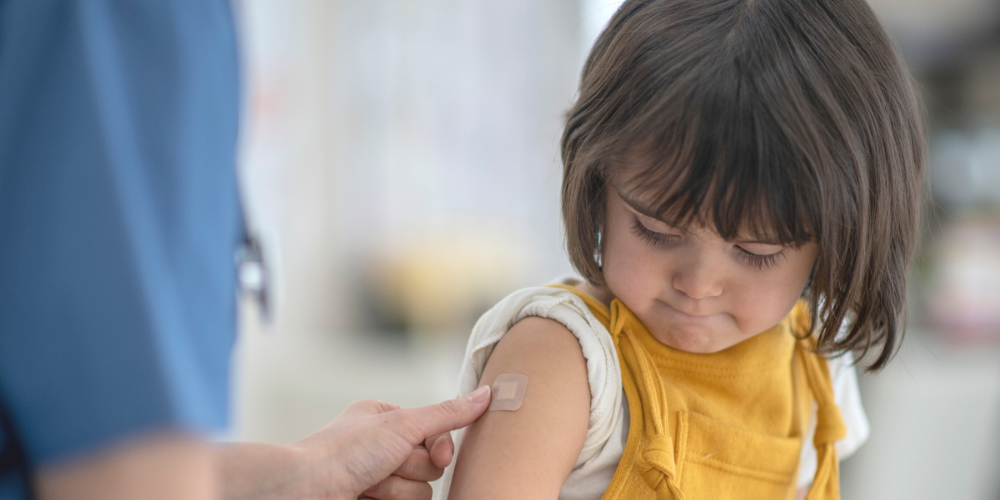Did you know that immunization prevents 4-5 million deaths each year from preventable diseases such as influenza, measles, pertussis (whooping cough), and tetanus? The World Health Organization (WHO) reports that vaccinations have helped decrease global measles deaths by 73%. And we are much closer to eliminating polio, an infectious viral disease that causes irreversible paralysis, worldwide.
August is National Immunization Awareness Month, so we wanted to share some helpful information on immunization and vaccinations to assist parents in understanding the importance of vaccinating their children and themselves from some potentially life-threatening diseases.
This article will cover what vaccination means, why vaccines are important, vaccine safety, vaccine myths and facts, and why people of all ages need to work with their health care provider to stay on top of their vaccination schedule to avoid untimely deaths from vaccine-preventable diseases.
What is Vaccination?
Let’s begin by defining the differences between vaccines, vaccination, and immunization.
- Vaccines are medicine specifically developed to prevent disease. They are weakened or killed forms of the virus or bacteria. Vaccines are used to stimulate your immune system to generate antibodies to fight a particular disease without being exposed to the disease.
- Vaccination is the process of administering a vaccine through injection, nasal spray, or by mouth to induce the body to produce immunity against a specific disease or infection.
- Immunization is when a person is protected (or immune) from a certain disease through vaccination.
Why Vaccines Are Important
Vaccines save lives! They are one of the most remarkable medical discoveries of our time. Without vaccines, there would be more premature deaths from infectious diseases, especially in children, and potentially more severe chronic illnesses across the globe. To date, smallpox is the only deadly disease to be eradicated worldwide.
While vaccine-preventable diseases are still prevalent in some parts of the world, the United States no longer has to worry about certain infectious diseases due to immunization. But, this would change if people in America stop getting vaccinated.
Diseases preventable by vaccines would start spreading again, and mortality rates would steadily climb each year. The reason is vaccine-preventable diseases are still significant threats in different parts of the world and can quickly migrate into the United States through immigration or global travel. When people in America stop receiving (or refuse to receive) their recommended vaccinations and get exposed to a particular viral disease, they can become severely ill and spread it to their friends, family, and community.
Additionally, vaccinations help with herd immunity (also known as community or population immunity). Herd immunity occurs when a sizeable amount of the population is immune to a particular virus. Immunity can occur through vaccination or by being infected by the virus. The benefits of population immunity are 1) it’s more difficult for a virus to spread throughout a community, 2) it helps protect people who are not sick or cannot get vaccinated, such as people with medical conditions, against the virus.
Are Vaccines Safe?
Vaccines are an excellent and safe way to protect the public from contagious diseases. In the United States, vaccines are held to rigorous safety standards. As required by law, several security measures are in place to ensure that vaccines can be safely given to millions of American children and adults.
According to the U.S. Department of Health and Human Services (HHS), all vaccines are tested in labs before they are recommended for use on people. The Food and Drug Administration (FDA) uses the lab test results to determine if the vaccine should be tested using people in clinical trials.
Clinical trials typically begin with less than 100 people who volunteer to get vaccinated but eventually expand to include thousands of volunteers. The clinical trials can last several years and answer critical questions such as:
- How safe is the vaccine?
- What is the right dose to provide?
- How does the body react?
- What are the side effects?
- Is the vaccine safe for children?
The FDA approves and authorizes a vaccine only when safety and quality concerns are met. In addition, vaccines continue to be monitored for safety and quality assurance by the FDA, the Centers for Disease Control and Prevention (CDC), and other federal agencies even after vaccines are recommended to the public.
Vaccine Myths and Facts
Don’t let fear and misinformation guide your decision not to vaccinate yourself or your children. Understanding vaccine facts versus myths will help you make the most informed decision so that you can protect yourself, your kids, and your community.
Here are five common vaccine myths (false assumptions) and their facts (based on scientific evidence and research):
Myth #1: Diseases that vaccines prevent are eliminated from the U.S., so I don’t need to get myself or my kids vaccinated.
Fact #1: Vaccinations play a significant role in helping to reduce or eliminate some preventable diseases. However, there is a good chance they will become prevalent again if immunization were to cease in the United States. On April 24, 2019, the CDC reported 695 new measles cases in 22 states across America. This statistic is alarming since measles were eradicated from the U.S. in 2000. So the best way to keep America safe from infectious diseases is to continue keeping up with vaccination schedules for both children and adults.
Myth #2 – Vaccines will give my child autism.
Fact #2 – There is no medical or scientific evidence linking vaccines to autism or autistic disorders. The 1998 Wakefield study that raised concerns between the MMR (measles, mumps, and rubella) vaccine and autism was severely flawed and later retracted by the publishing journal Lancet. In addition, a 2013 CDC study showed that vaccines do not cause ASD.
Myth #3 – Diseases won’t spread if there are proper hygiene and sanitation controls in place.
Fact #3 – The unfortunate reality is that infectious diseases can spread from person to person and throughout the community and the world regardless of proper hygiene or sanitary measures. When a large cluster of the population is unvaccinated, contagious diseases that have been eradicated in the U.S., such as polio or measles, can quickly reappear and cause a national or even a worldwide pandemic.
Myth #4 – Getting vaccinated is unnecessary. My body can build immunity to the disease if I catch it.
Fact #4 – Waiting to get infected by a contagious disease to build natural immunity instead of vaccinating for the disease could severely harm your health. For example, getting infected with Haemophilus influenza (Hib) could result in mental retardation, an infection from hepatitis B could result in liver cancer, or an infection from measles could result in death. Furthermore, you’re not only putting yourself at risk of catching an infectious disease but also your family and your community.
Myth #5 – Vaccines don’t provide 100% protection from diseases so it’s not worth getting vaccinated.
Fact #5 – While no vaccines provide 100% protection against diseases, they offer enough protection (85%-90% or higher) to make them an effective and safe way to prevent harmful infections. People who stay on top of their recommended vaccination schedules have a greater chance of becoming less sick if they encounter the disease. Moreover, the more vaccinated people there are in a community where an infectious disease, such as measles, is prevalent, the less likely it will spread to harm people who cannot get vaccinated due to age or medical conditions.
Vaccinations for Children

The Centers for Disease Control and Prevention (CDC) recommends maintaining a regular schedule of vaccinations for children from birth until 17 years of age. Routine vaccinations throughout childhood are critical because it helps provide immunity before children get exposed to potentially life-threatening diseases.
Unfortunately, the coronavirus pandemic halted regular well-child visits for most kids over the past year. This disruption caused many children to fall behind on getting their recommended vaccines. Well-child visits and recommended vaccinations are vital to ensure kids stay healthy and protected from harmful diseases. Unvaccinated children have a higher chance of getting diseases such as measles and whooping cough, which are highly contagious and dangerous, especially for babies and young children. The CDC reports that there have been more outbreaks of these infectious diseases in recent years, especially in communities with low vaccination rates.
Now is the perfect time to contact your primary care doctor (or primary care provider) to schedule a well-child check-up to get your kids caught up on their vaccinations, especially as schools and daycares open up for in-person learning and care. Your primary care provider has your child’s medical records on file and is in the best position to discuss their health care and vaccine needs with you.
If you need a primary care physician and live in the Katy, TX or greater Houston area, contact Mason Park Medical Clinic to schedule a well-child visit with Dr. Quyen Trinh, DO, or one of our other family medicine practitioners. We offer health and wellness services for children five years and older.
Vaccinations for Adults
The CDC reports that thousands of adults in America are hospitalized each year for vaccine-preventable diseases, resulting in many deaths. Unfortunately, some adults don’t realize that the protection from some childhood vaccinations diminishes over time, putting them at significantly higher risk of getting infections due to their age, lifestyle, medical conditions, line of work, and travel schedules.
The CDC strongly recommends that adults in the United States 18 years of age and older speak with a primary care doctor to discuss the appropriate vaccination schedule based on their circumstances.
Through annual exams and well visits, a primary care provider can help recommend the proper vaccination schedule based on your risk factors. A personalized vaccination schedule will help prevent serious illnesses that can negatively impact your health, make you miss work, increase your medical bills, or affect your ability to take care of your family.
Don’t Wait! Contact Us to Vaccinate!

If you’re not sure of which vaccinations you, or a family member needs, give us a call (281) 646-0740 to schedule an appointment with one of our general practitioners.
At Mason Park Medical Clinic in Katy, TX, our patients are our top priority. We have a dedicated and caring team of family care providers ready to help you and your entire family with annual check-ups, well-child visits, immunization catch-up, or any other health care concerns you may have. Contact us today.




